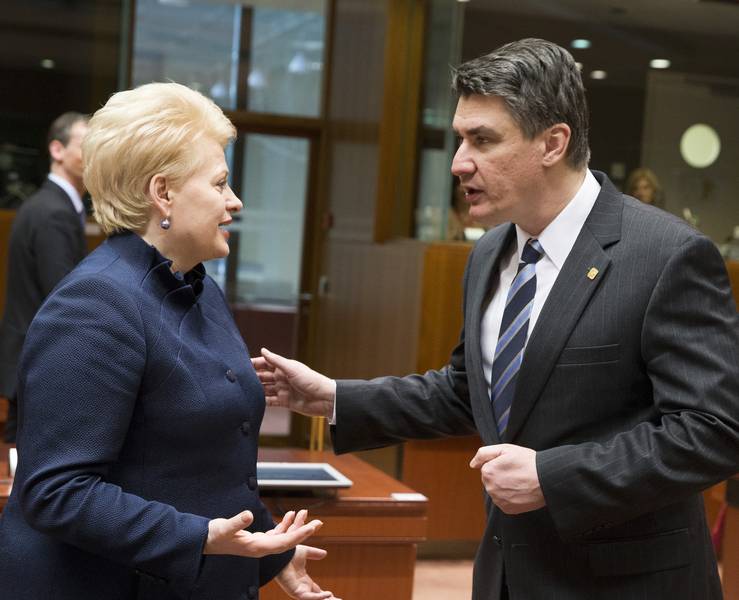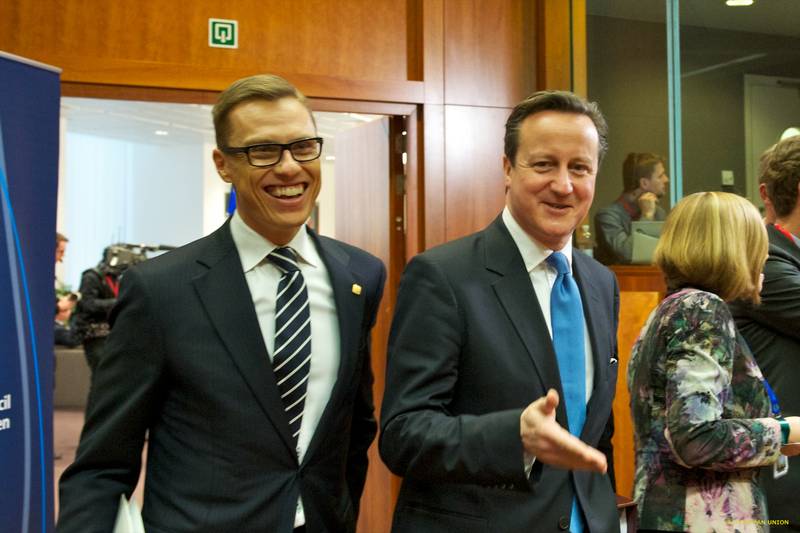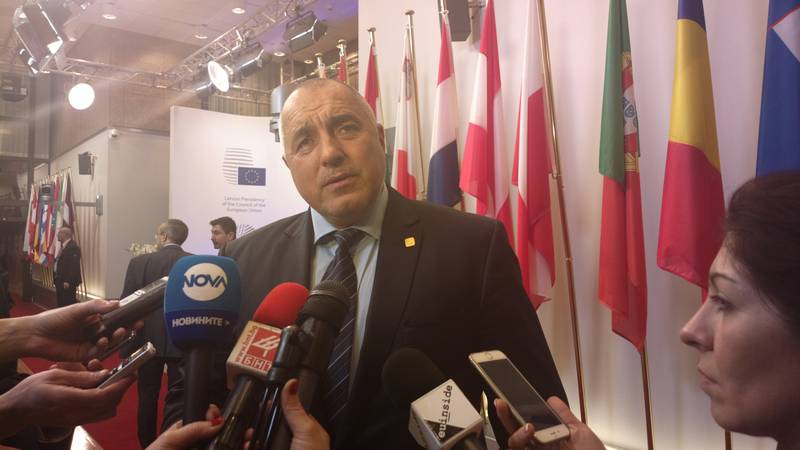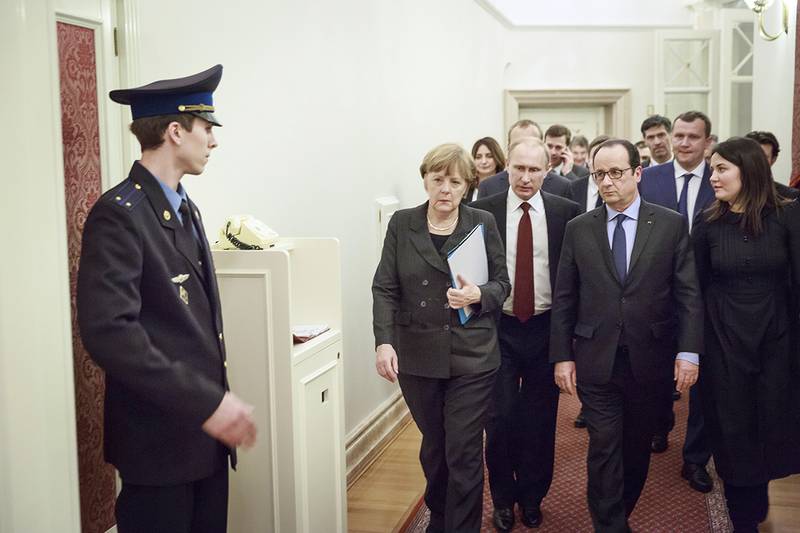Moscow Warned Zagreb for Croatian Fighters on Ukrainian Side - UPDATED
Adelina Marini, February 13, 2015
 Hours after the second peace deal between Ukraine and Russia (Minsk 2) was struck Russia hinted that it, too, might not have a chance because Russia will take advantage of the fact that citizens of EU member states are fighting on the Ukrainian side to claim that the Kremlin has nothing to do with the Russian fighters in Ukraine. This has become clear from the sharp warning of the Russian ministry of foreign affairs to Croatia because of Croatian citizens fighting on the side of Ukraine. "Moscow is concerned and surprised that Croatian First Deputy Prime Minister and Minister of Foreign and European Affairs Vesna Pusic confirmed in a statement to the media that Croatian soldiers were fighting in the Ukrainian army", reads the statement of the Russian ministry quoted by the ITAR-TASS news agency whose story was shared on the Twitter by the account of the ministry. "It is remarkable that statements about European nationals’ involvement in Kiev forces’ punitive operations are being made together with unfounded accusations of Russian soldiers' presence in Ukrainian territory", the statement reads.
Hours after the second peace deal between Ukraine and Russia (Minsk 2) was struck Russia hinted that it, too, might not have a chance because Russia will take advantage of the fact that citizens of EU member states are fighting on the Ukrainian side to claim that the Kremlin has nothing to do with the Russian fighters in Ukraine. This has become clear from the sharp warning of the Russian ministry of foreign affairs to Croatia because of Croatian citizens fighting on the side of Ukraine. "Moscow is concerned and surprised that Croatian First Deputy Prime Minister and Minister of Foreign and European Affairs Vesna Pusic confirmed in a statement to the media that Croatian soldiers were fighting in the Ukrainian army", reads the statement of the Russian ministry quoted by the ITAR-TASS news agency whose story was shared on the Twitter by the account of the ministry. "It is remarkable that statements about European nationals’ involvement in Kiev forces’ punitive operations are being made together with unfounded accusations of Russian soldiers' presence in Ukrainian territory", the statement reads.
It urges the Croatian authorities to pay special attention on the decisions taken by the contact group in Minsk today (12 February), which means to do what is necessary to withdraw the Croatian citizens from Ukraine. The Croatian foreign ministry responded by welcoming the Minsk 2 deal but pointed out that the Croatian citizens (eight people) are not linked in any way to any state institution and Croatia does not in any way support them. According to Croatian media, those are former war veterans from the Croatia's independence war from ex-Yugoslavia in the beginning of the 1990s. "Although those are a small number of people we are concerned and we are following the situation very seriously". The Croatian ministry also points out that all fighters, including the Croatian ones, who are in Ukraine should return to their home countries to give a chance to the agreement to deliver.
Prime Minister Zoran Milanovic of Croatia said before the informal EU summit in Brussels that there is nothing that can be done on the matter since this is not a terrorist organisation. If their participation is in any way linked to terrorism not only in Ukraine but in the Middle East as well which, according to him, is much more serious, then all countries, including Croatia, should seek ways to react. Today it is usual people with different motives, most of all money, to leave to fight. "Unfortunately, this is a fact", said Milanovic. He added that the situation in Ukraine today reminded him very much of what Croatia went through during the independence war. The same type of negotiations, the same type of ceasefire, he said.
Before the beginning of the summit, which is denominated by the situation in Ukraine and which the Ukraine President Petro Poroshenko joined briefly, almost all leaders of the member states were cautious about Minsk 2 because the previous Minsk agreement was not implemented. "Today's Minsk agreement is welcome news and gives hope. Hope is good, even essential, but hope is not enough. The real test is respect for the cease fire on the ground. The first Minsk agreement was not, if you remember, respected", said European Council President Donald Tusk. Later, responding to a question by euinside after the end of the summit, Mr Tusk said, however, that there was no evidence of involvement of EU citizens in the fighting in eastern Ukraine. "It is my assessment and my intituition but it's rather a propaganda today than fact. And for sure, this is not the main problem when it comes to implementation. The first need today is the good will of the Russian side", Tusk added. French President Francois Hollande, who took part in the negotiations on the agreement in Minsk, also said that an agreement does not guarantee it will be implemented. "We need to be vigilant", he told journalists.
 "If this is a genuine ceasefire that would be welcome but what matters most of all is, actually, actions on the ground rather than just words on a peace of paper. And I think we should be very clear that Vladimir Putin needs to know that unless his behaviour changes the sanctions we have in place won't be altered", said the prime minister of UK, David Cameron. EU's High Representative for foreign policy Federica Mogherini said she would present the leaders with concrete proposals for monitoring of the implementation of the agreement. "Since the last peace agreement was agreed a thousand people have died", recalled Finland's Prime Minister Alexander Stubb and added that this is the end of an era - the end of the end of the Cold War. According to him, the Greek situation and Ukraine are intertwined because the Greek government has very close relations with Russia. "I, of course, believe that as a member of the EU and the eurozone Greece will remain steadfast and true to the European values", Mr Stubb concluded.
"If this is a genuine ceasefire that would be welcome but what matters most of all is, actually, actions on the ground rather than just words on a peace of paper. And I think we should be very clear that Vladimir Putin needs to know that unless his behaviour changes the sanctions we have in place won't be altered", said the prime minister of UK, David Cameron. EU's High Representative for foreign policy Federica Mogherini said she would present the leaders with concrete proposals for monitoring of the implementation of the agreement. "Since the last peace agreement was agreed a thousand people have died", recalled Finland's Prime Minister Alexander Stubb and added that this is the end of an era - the end of the end of the Cold War. According to him, the Greek situation and Ukraine are intertwined because the Greek government has very close relations with Russia. "I, of course, believe that as a member of the EU and the eurozone Greece will remain steadfast and true to the European values", Mr Stubb concluded.
Lithuania's President Dalia Grybauskaite criticised the agreement calling it "weak". It is only partial, just a ceasefire of the kind we already had five months ago. The new one lacks border control which means that the border is open for more military interventions and military equipment, she said.
 Kolinda Grabar-Kitarovic | © KGK
Kolinda Grabar-Kitarovic | © KGK Jozo Rados | © European Parliament
Jozo Rados | © European Parliament Aleksandar Vucic, Andrej Plenkovic | © Vlada RH
Aleksandar Vucic, Andrej Plenkovic | © Vlada RH Boyko Borissov | © euinside
Boyko Borissov | © euinside Angela Merkel, Vladimir Putin, Francois Hollande | © Bundesregierung
Angela Merkel, Vladimir Putin, Francois Hollande | © Bundesregierung